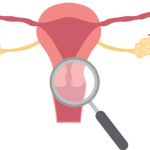
What is Anemia?
Anemia is a condition when your body doesn’t have enough red blood cells to carry oxygen from the lungs to different parts of the body, or there is a shortage of iron-rich protein called hemoglobin (Hb).
Three main reasons can cause anemia:
- Loss of blood
- Decreased or faulty production of red blood cells
- Destruction of red blood cells
You may experience Iron deficiency anemia as your body attempts to use your iron stores to make more hemoglobin that can carry oxygen to supply to various body cells. In this process, your iron store levels may deplete to the point that you may suffer from iron-deficient anemia. Your healthcare provider can order a blood test to determine your iron levels. A complete blood count (CBC) test measures how many red blood cells there are as well as if you have enough vitamin B12 and E. Low red blood cell counts can be caused by many health conditions, including uterine fibroids and anemia.
Can Fibroids Cause Anemia?
In many cases, uterine fibroids can cause heavy, prolonged periods or bleeding between menstrual cycles. Specifically, different kinds of fibroids may cause more bleeding than others.
Submucosal fibroids located within the uterine lining can cause severe bleeding by increasing the area of the lining and thus the flow of menstrual cycles. Moreover, intramural fibroids are fibroids lying within the uterine muscle that may increase blood flow to the uterus, thus affecting its ability to control blood and increase the size of the uterine cavity; all these factors collectively result in increased menstrual flow. This increased bleeding can result in clots in some women and may pass very large blood clots with their flow.
LEARN MORE – MEET WITH A FIBROID SPECIALIST
Anemia comes in a few different forms:
- Iron-deficient anemia: This is the most common type of anemia which is characterized by the overall decrease in the number of Red Blood Cells (RBCs) and the level of hemoglobin.
- Pernicious anemia This anemia occurs when the body doesn’t produce enough intrinsic factor, a type of protein that binds with vitamin B12 for its easy absorption in the small intestine. Without a sufficient amount of intrinsic factor, the body can’t produce an optimum amount of RBCs. [1]
- Hemolytic anemia: This condition occurs when RBCs die before their normal lifespan of four months or are destroyed prematurely. The bone marrow isn’t able to produce enough RBCs to replenish the lost ones, decreasing the blood’s capacity to carry oxygen.1
- Thalassemia: The condition is characterized when the body produces an abnormal form of hemoglobin that causes premature destruction of RBCs. 1
- Aplastic anemia: This rare form of anemia is caused due to a decrease in normal levels of RBCs, White Blood Cells (WBCs), and Platelets in the blood. 1
Stages of Iron Deficiency Anemia
Iron deficiency anemia presents in different stages, from mild anemia with no notable symptoms to debilitating symptoms that require immediate attention. The earlier you get anemia diagnosed, the quicker you can recover.
- Iron depletion means you have no reserves of iron even though your levels may test normal. You don’t have any noticeable symptoms of anemia.
- Iron deficiency occurs when the iron levels are low, and hemoglobin levels are lower than normal. You may begin to feel tired.
- Iron deficiency anemia is a severe form requiring medical attention since it often affects daily living. The symptoms are noticeable, including dizziness, fatigue, experiencing breathlessness after performing simple tasks, and looking tired and pale.
Symptoms of Anemia in Women
Many women don’t realize they have anemia even though they experience the symptoms. They might blame these symptoms on other issues like menstruation or stress. Here is a brief list of anemia symptoms to watch out for::
- Fatigue and loss of energy
- Shortness of breath
- Dizziness
- Insomnia
- Unusually rapid heartbeat
- Pale or yellow skin
- Cold hands and feet
SIGN UP FOR MORE HEALTH NES & UPDATES
Anemia and Weight Gain
Not having enough iron in your blood can make it difficult to lose weight. If you consistently feel tired and lack energy, it’s difficult to motivate yourself to get proper exercise, and weight gain becomes more probable.
Anemia and Weight Loss
Anemia can lead to weight loss if another medical condition accompanies it. For instance, people with cancer may be anemic and display significant weight loss. If you have gone through weight loss surgery, you may develop anemia due to not getting enough vitamins and minerals in your diet.
What are Fibroids?
Uterine fibroids are benign, or non-cancerous, growths or tumors located in or on the uterus. They can grow in various areas, either as a single fibroid or in clusters. They can be as tiny as a seed or grow as large as a melon. The following symptoms often accompany fibroids, even though many women experience no symptoms at all:
- Heavy bleeding
- Severe menstrual cramps
- Enlarged uterus
- Frequent urination
- Longer periods than normal
The symptoms of fibroids can be debilitating, with heavy bleeding being the most common symptom.
TAKE OUR FREE FIBROID SYMPTOM CHECKER
How is Anemia Diagnosed?
A doctor will diagnose anemia based on your medical and family histories, a physical exam, and results from tests such as a complete blood count (CBC). It’s important to note any and all medications you may be taking, which may affect your CBC. You may also be asked what your diet is like, because people who are vegan or are on various diets may develop a deficiency from not eating enough iron-rich foods.
Because anemia doesn’t always cause symptoms, your doctor may find out you have it while checking for another condition.
Schedule Your AppointmenT TODAY
Does Being Anemia Make Your Period Worse?
Due to heavy bleeding, the person may have a shortage of iron as the red blood cells contain iron which is drained out of the body with blood loss. Blood is created in the body’s bone marrow, and chronic bleeding due to your uterine fibroids can result in the reduced bone marrow response, further worsening the symptoms of anemia for the patient. Any bleeding in women with absent iron stores will result in anemia. Some women have not exhibited any symptoms; however, some women will constantly feel tired or light-headed. This can impact both work and personal life. Anemia can make getting out of bed in the morning nearly impossible; therefore, it’s important to get checked out if your periods are heavy or lengthy.
Many women don’t even realize that they have heavy periods because they think that’s their “normal.” It’s vital to track your period so that you can notice the length and any changes throughout your menstrual cycle. Bleeding between periods is another sign that you may have fibroids. An abnormal period is characterized as lasting over ten days a month.
Heavy menstrual bleeding can also result from other causes like hormonal imbalance, dysfunction of ovaries, uterine polyps, polycystic ovarian syndrome, endometriosis, ADENOMYOSIS, anti-inflammatory medications, etc. So, the exact cause of anemia must be ascertained before opting for a treatment method.
MORE QUESTIONS? TALK TO A FIBROID SPECIALIST NOW
How to Treat Anemia Caused by Uterine Fibroids
Our uterine fibroid specialists treat uterine fibroids with a procedure known as Uterine Fibroid Embolization, or UFE. This is performed by injecting tiny particles called embolic agents into your arteries that feed your uterine fibroids.
The interventional radiologists at our treatment centers constantly implement advanced, minimally invasive techniques to improve patient outcomes. Our doctors use a personalized care approach that encompasses each patient’s individual needs.
Contact USA Fibroid Centers
USA Fibroid Centers can help you get the relief you want from your uterine fibroids, so you can enjoy life again without the fatigue and lack of energy you experience with anemia. You can schedule an online consultation with our fibroid specialists or simply call us at 855.615.2555.




